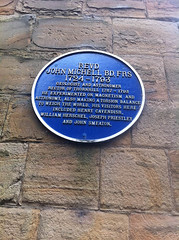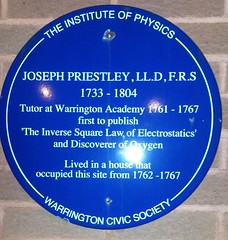Dr Joseph Priestley FRS LLD


Dr Joseph Priestley FRS LLD
(1733-1804)
Commemorated on 13 plaques
Joseph Priestley 1733-1804 scientist, philosopher and theologian was Minister to the Gravel Pit Meeting here in 1793-1794
7-9 Chatham Place, Hackney (north wall), London, United Kingdom where they was Minister to the Gravel Pit Meeting
The Leeds Library A proprietary subscription library founded in 1768 with Joseph Priestley as Secretary. Since 1808 it has occupied these purpose-built premises designed by Thomas Johnson. The first-floor reading room and Thomas Ambler's 'New Room' extension are amongst the architectural wonders of Leeds.
18 Commercial Street, LS1, Leeds, United Kingdom where they was (1767)
On this site in the former New Meeting House Joseph Priestley LLD FRS scholar, scientist, theologian and discoverer of oxygen ministered to his congregation from 1870 to 1791
St Michael's Catholic Church, New Meeting Street (off Moor Street Queensway), Birmingham, United Kingdom where they was
Revd John Michell BD. FRS 1724-1793 geologist and astronomer. Rector of Thornhill 1767 - 1793. He experimented on magnetism and astronomy, also making a Torsion balance to weigh the world. His visitors here included Henry Cavendish, William Herschel, Joseph Priestley and John Smeaton.
Thornhill Parish Church, Church Ln, Thornhill, Dewsbury, United Kingdom where they visited
Joseph Priestley 1733-1804 ministered here 1755-1758. Discovered Oxygen.
Church, High Street, Needham Market, United Kingdom where they minister
Mill Hill Chapel This elegant Gothic building, designed by Bowman and Crowther in 1848, replaced the original 17th century chapel. Its congregation - formerly Presbyterian, now Unitarian - dates from 1672. Joseph Priestley LLD FRS discoverer of oxygen, was minister here 1767-1773.
Park Row, Leeds, United Kingdom where they minister
Joseph Priestley Theologian, scientist & discoverer of oxygen. Lived in a house on this Site 1792-1794
113 Lower Clapton Road, Hackney, London, United Kingdom where they lived
Joseph Priestley Discoverer of oxygen born on this site A.D. 1733
Owler Lane, Birstall, United Kingdom where they was born (1733)
Joseph Priestley. The noted English scientist, discoverer of oxygen, and Unitarian theologian lived in Northumberland, 1794 to 1804. His home and laboratory along the river are now a Priestley memorial and museum.
Duke St. (PA 147) at 10th St., Northumberland, PA, United States where they lived near (1793-1803)
Joseph Priestley House. Home, 1794-1804, of the noted English scientist. Administered by the Pennsylvania Historical and Museum Commission.
472 Priestley Ave., Northumberland, PA, United States where they lived (1793-1803)
Joseph Priestley 1733-1804 Distinguished Chemist Discoverer of Oxygen Conducted worship here whilst Unitarian Minister Nantwich, Cheshire, c.1761
Lower Street, Newcastle-under-Lyme, United Kingdom where they conducted worship
Joseph Priestley LLD FRS 1733 - 1804 Tutor at Warrington Academy 1761 - 1767 first to publish 'The Inverse Square Law of Electrostatics' and Discoverer of Oxygen Lived in a house that occupied this site from 1762 - 1767
Academy Street, Warrington, United Kingdom where they lived (1762-1767)
Sweet Briar Hall Built late 15th century, the octagonal bay added 16th century. It was occupied from 1758-61 by Jos. Priestley, Scientist, while Unitarian minister. Undamaged by the great fire of 1583 which reached the adjoining building
65-67 Hospital Street, Nantwich, United Kingdom where they was












_03.jpg?width=250)